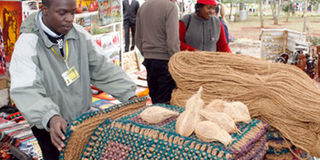Uganda talks value addition as mineral prices fall

An exhibitor at the recent Agoa conference in Nairobi, Kenya. Traders say treaties such as Agoa should seek to grow local traders because they are disadvantaged. FILE PHOTO.
Kampala. Prices of mineral products like copper have been declining in the last one year globally as a result of slowed demand from China – the world’s largest consumer of the products.
In the midst of price tumblings, Uganda will be talking mineral value addition at the Mineral Wealth Conference this week.
To add value to its unknown mineral potential, Uganda is looking to attract big names in the mining sector but the timing may be wrong.
Glencore, the largest steel products manufacturer, has recently had the company valuation tumble after a 25 per cent fall in prices of copper, aluminium and nickel.
Uganda resumed copper production at Kilembe Mines for the first time since the 1980s.
A contract signed between the Uganda government and the Chinese firm, Tibet-Hima, only allows value addition with no copper being exported in raw form.
Thousands of jobs are already at stake as economies dependent on extractives like South Africa and Zambia pay a heavy price.
However, Mr Richard Kaijuka, the vice chairperson Uganda Chamber of Mines and Petroleum, is downplaying the worries, insisting Uganda has to be ready because value addition doesn’t happen by a snap of a finger.
“We do not want to be caught with pants down. We want to prepare society on what should be ideal in terms of maximising returns...,” Kaijuka said during a media briefing at the ENS Africa offices.
Value addition in Uganda has been more contentious in the iron ore segment, especially after President Museveni imposed an export ban on the raw form of the mineral.
The stand has been that steel companies should use the ore deposits but this is yet to happen despite some steel companies holding exploration licences.
Uganda has been unable to attract big players in the mining sector partly due to challenges in land acquisition and illegal mining like the one going on in Mubende and Karamoja. The gold rush in Mubende now has in excess of 20,000 miners and the Mining Leaseholder has been unable to access the land. Proposed changes to the Mining Act and Policy are yet to be tabled in Parliament.
“We want to acknowledge the fact that this (access to land) is one of the areas we think will make or break whether we have smooth operations in the mining sector. We can’t just go on as the situation as it is just now,” he said.
At the conference on 1st and 2nd October, investors will be seeking answers from the Uganda government at a time the extractives are facing headwinds globally.




